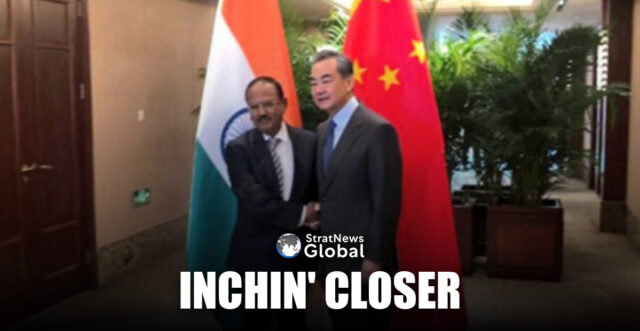India’s National Security Advisor Ajit Doval and China’s Foreign Minister Wang Yi met in Beijing on Wednesday to discuss strategies for restoring peace along the Line of Actual Control (LAC) and repairing bilateral relations strained since 2020.
The 23rd round of Special Representatives’ talks, held after a five-year hiatus, marked a renewed effort to address tensions stemming from the prolonged military standoff in eastern Ladakh. Reports said Doval and Wang explored avenues to stabilize all aspects of the bilateral relationship and rebuild trust.
The meeting follows talks between Indian Prime Minister Narendra Modi and Chinese President Xi Jinping in Russia this October, and the subsequent decision to revive talks while emphasizing mutual respect for each nation’s core interests and the constructive resolution of differences.
India has consistently made it clear to China normalcy in the relationship is contingent upon peace and tranquility in the border areas and respect for the LAC.
This came just days after India and China reached a critical agreement on patrolling protocols along their disputed border, effectively ending the four-year-long military standoff in eastern Ladakh.
According to one report, the two sides agreed to
- Implement the important common understandings between the leaders of China and India
- Respect each other’s core interests and major concerns
- Strengthen mutual trust through dialogue and communication
- Settle differences with sincerity and good faith, and
- Bring bilateral relations back to the track of stable and healthy development..
Doval and Wang last engaged in September in St. Petersburg, Russia, where they pledged to accelerate disengagement efforts along the contested frontier.
The latest round of talks builds on this commitment, with discussions aimed at solidifying the disengagement process in areas like Demchok and Depsang, key friction points in the border dispute.
Earlier, EAM S Jaishankar informed the Parliament that the disengagement between India and China has been fully achieved in Eastern Ladakh through a step-by-step process in Depsang and Demchok.
The border tensions escalated in 2020 following a deadly clash in the Galwan Valley, which claimed the lives of 20 Indian soldiers and an unknown number of Chinese troops, although an Australian website claimed that it was over 40.
This incident marked a low point in bilateral relations, eroding trust and freezing communication channels. Efforts to de-escalate began with piecemeal agreements, including the October 2024 deal on patrolling and disengagement.
“China is ready to work with India to implement the important common understandings between the leaders of China and India, respect each other’s core interests and major concerns, strengthen mutual trust through dialogue and communication, properly settle differences with sincerity and good faith, and bring bilateral relations back to the track of stable and healthy development as soon as possible,” Chinese foreign ministry spokesperson Lin Jian said on Tuesday.
This was echoed by China’s ambassador to India Xu Feihong in a post on X on Wednesday.
The Special Representatives’ mechanism, established in 2003 to address the boundary dispute along the 3,488-km border, continues to serve as a vital platform for reducing tensions. The revival of the talks after five years indicates an attempt to rebuild trust and move toward a stable, cooperative relationship.
However, the trust deficit will take a long time to bridge, and it is likely that Indian forces will continue to stay on high alert along the border until the government is convinced about China’s intentions.
In a career spanning three decades and counting, Ramananda (Ram to his friends) has been the foreign editor of The Telegraph, Outlook Magazine and the New Indian Express. He helped set up rediff.com’s editorial operations in San Jose and New York, helmed sify.com, and was the founder editor of India.com.
His work has featured in national and international publications like the Al Jazeera Centre for Studies, Global Times and Ashahi Shimbun. But his one constant over all these years, he says, has been the attempt to understand rising India’s place in the world.
He can rustle up a mean salad, his oil-less pepper chicken is to die for, and all it takes is some beer and rhythm and blues to rock his soul.
Talk to him about foreign and strategic affairs, media, South Asia, China, and of course India.





